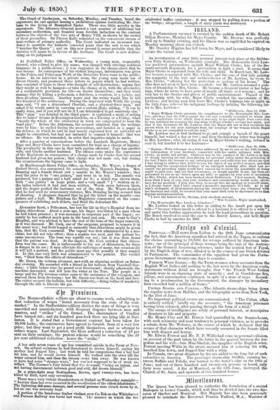lurtigu guh tulnuird.
PORTUGAL.—Mail news from Lisbon to the 29th June communicate6 the fact, that the American squadron had arrived in the Tagus, to enforce the claims amounting to 70,000/. for wrongs suffered by American inte- rests; one of the principal of those wrongs being the case of the destruc- tion of the General Armstrong schooner, under the neutral fort of Faye', by the English ships of war, alluded to in the course of our Greek debates in Parliament. The commander of the squadron had given the Portu- guese Government twenty-one days to consider. FRENCH WEST INnias.—By the Trent steamer, whose accounts from the English West Indies add nothing to the last news by the American route, statements without detail are brought, that "the French West Indian Islands were in an alarming state of anarchy ; and in Guadeloupe fire, pillage, and assassination continued, in spite of a state of siege. Accord- ing to a proclamation by the Government, the damages by incendiary fires exceeded half a million of francs." UNITED STATES AND CANADA.—The Atlantic steam-ships bring down the regular news from Halifax, and the telegraphic news from New York, to the 21st of June.
No important political events are communicated. "The Cuban affair is entirely settled," briefly say the accounts ;„ " the American prisoners having been released, after passing through the form of a trial," The scraps of intelligence are solely of personal interest, or descriptive of disasters to life and property. Mr. limey Clay and Mr. Benton had quarrelled in the Senate-house, with such aorimony and near tendencyto personal violence, as to provoke a rebuke from Mr. Webster, in the course of which he declared that the scenes of that character which have recently occurred in the Senate filled him with disgust and horror.
Mr. Edwin Forrest and Mr. N. P. Willis had come in personal collision, on account of the part taken by the latter in the quarrel between the tra- gedian and his wife—late Miss Sinclair, the daughter of the English acton, Forrest meeting Willis in the street, accused hins of seducing his wife, knocked him down, and flogged him with a whip. In Canada, two great disasters by fire are added to the long list of such calamities in America. The passenger steam-ship Griffith, running be- tween Buffalo and Toledo, was burned to the water's edge on the 16th qf June; and out of three hundred and twenty-six persons on board, only forty were saved. A fire at Montreal, on the 15th Jane, destroyed the Church of St. Anlis, and upwards of two hundred houses.


























 Previous page
Previous page